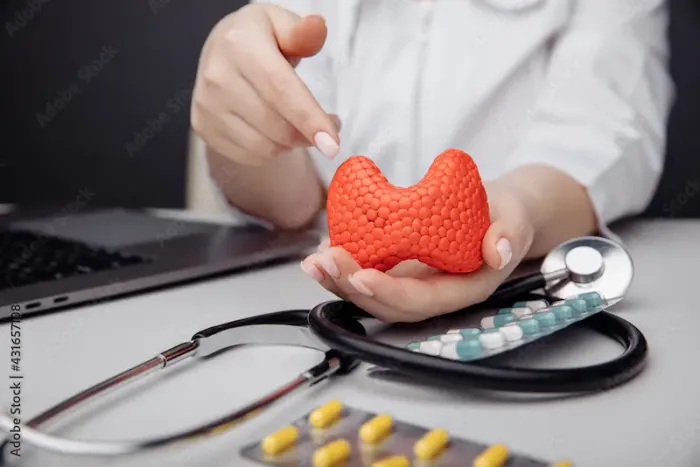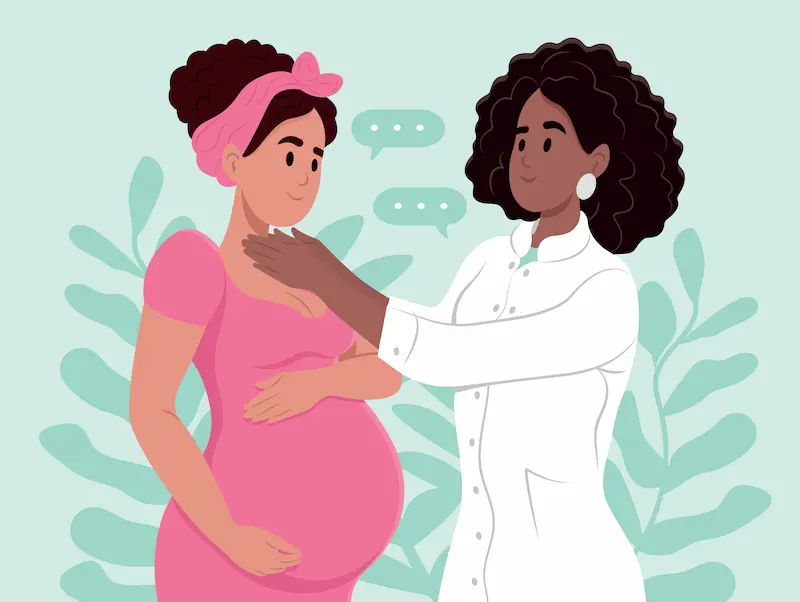Hypothyroidism and Pregnancy Your Essential Guide to a Healthy Journey
Discover how to manage hypothyroidism during pregnancy for a safe and healthy journey. Learn about symptoms, treatment, risks, and preconception planning.

Written by Dr. Md Yusuf Shareef
Reviewed by Dr. Shaik Abdul Kalam MD (Physician)
Last updated on 13th Jan, 2026

Introduction
Congratulations on your pregnancy! This is a time of incredible change and excitement. Amidst the joy, it's crucial to pay attention to your health, and that includes a small but mighty gland in your neck: your thyroid. Hypothyroidism during pregnancy, an underactive thyroid gland, is a common condition that requires careful management for the well-being of both you and your growing baby. When untreated, it can pose risks, but the excellent news is that it is easily manageable with proper care. This comprehensive guide will walk you through everything you need to know—from understanding symptoms and getting an accurate diagnosis to safe treatment options and postpartum care. Think of this as your trusted partner, empowering you with knowledge for a healthy and happy pregnancy journey.
What is Hypothyroidism?
Hypothyroidism is a medical condition where your thyroid gland fails to produce sufficient amounts of crucial thyroid hormones, primarily thyroxine (T4). Think of your thyroid as your body's thermostat; it regulates metabolism, energy levels, temperature, and most importantly for pregnancy, it plays a star role in your baby's development.
How Your Thyroid Works
Your thyroid's operation is a classic feedback loop. Your brain's pituitary gland releases Thyroid-Stimulating Hormone (TSH), which signals the thyroid to produce T4. This T4 is then converted into the active hormone T3 in your body's tissues. When thyroid levels are low, your pituitary gland releases more TSH to shout louder at the thyroid to work harder. Therefore, a high TSH level is the primary indicator of an underactive thyroid.
Why Thyroid Hormones are Crucial for Baby's Development
For the first 12-14 weeks of pregnancy, your baby is entirely dependent on your thyroid hormones for its brain development and nervous system formation. Even after the baby's own thyroid gland begins to function, it still relies on you for a portion of its thyroid hormone supply until birth. Adequate maternal thyroid hormone is fundamental for preventing developmental delays and ensuring healthy growth. This is why managing your hypothyroidism is not just about your health, but is a critical investment in your child's future.
Signs and Symptoms: Is It Pregnancy or Hypothyroidism?
This is a common dilemma, as the symptoms of an underactive thyroid often mimic the typical discomforts of pregnancy. Fatigue, weight gain, and feeling cold are hallmarks of both. However, there are signs that may point more specifically to a thyroid issue. Be mindful of:
• Unusual and persistent fatigue that feels debilitating
• Severe constipation that doesn't respond to dietary changes
• Muscle cramps and aches
• Dry, flaky skin and brittle hair
• Feeling excessively cold when others are comfortable
• Brain fog, forgetfulness, and difficulty concentrating
If you experience a cluster of these symptoms, especially if you have a family history of thyroid disease, it's important to bring it up with your obstetrician. If symptoms persist beyond two weeks, consult a doctor online with Apollo24|7 for further evaluation. They can help determine if testing is needed.
Consult a Gynaecologist for Personalised Advice
Why Uncontrolled Hypothyroidism is a Risk for You and Your Baby
Properly managed, hypothyroidism poses minimal risk. Uncontrolled, however, it can lead to serious complications.
Potential Risks for the Mother
For the expecting mother, unmanaged hypothyroidism increases the risk of:
• Anaemia: Reduced production of red blood cells.
• Preeclampsia: A dangerous condition characterised by high blood pressure and protein in the urine.
• Placental abruption: Where the placenta separates from the uterine wall prematurely.
• Postpartum haemorrhage: Excessive bleeding after delivery.
Potential Risks for the Developing Baby
The most significant risks are to the baby, underscoring the need for treatment:
• Preterm birth: Delivery before 37 weeks of gestation.
• Low birth weight: Babies weighing less than 5.5 pounds at birth.
• Impaired neurodevelopment: Thyroid hormone is critical for foetal brain development; a deficiency can impact IQ and cognitive function later in life.
• In severe, untreated cases, it can increase the risk of miscarriage and stillbirth.
Treatment and Management: Safely Navigating Pregnancy with Hypothyroidism
The management of hypothyroidism during pregnancy is straightforward and highly effective, giving you immense control over the outcome.
Levothyroxine: The Safe and Standard Treatment
The treatment is a synthetic form of the T4 hormone, identical to what your body makes. Brand names include Synthroid, Levoxyl, and Eltroxin. It is completely safe during pregnancy and is essential for your baby's health. Do not stop taking your medication because you are pregnant; in fact, the opposite is true.
How Your Medication Dosage Will Change
It is almost universal for your levothyroxine dosage to need an increase during pregnancy—often by 25-50%—sometimes as early as the first few weeks. This is due to increased hormone demand, higher blood volume, and the influence of pregnancy hormones like hCG. Your doctor will likely check your TSH levels every 4-6 weeks throughout pregnancy to ensure your dosage is perfect.
The Importance of Consistent Monitoring
Sticking to your monitoring schedule is non-negotiable. Take your medication on an empty stomach, at least 30-60 minutes before breakfast or coffee, for optimal absorption. Apollo24|7 offers convenient home collection for tests like TSH and T4, making it easier to get your levels checked without the hassle of lab visits.
Preconception Planning: Starting Your Pregnancy Journey Right
If you have a known thyroid condition and are planning to conceive, the best step you can take is to get your levels optimised before you get pregnant. The goal is to have your TSH level in the ideal preconception range (usually between 1.0-2.5 mIU/L). Achieving this significantly reduces the risk of complications and gives your baby the best start from the moment of conception.
Conclusion
Navigating a pregnancy with hypothyroidism might seem daunting at first, but it is a journey you can confidently manage with the right knowledge and support. By understanding the importance of your thyroid hormone, committing to regular monitoring, and working closely with your healthcare team, you are taking the most powerful steps to protect your health and ensure the best possible start for your baby. Remember, a diagnosis of hypothyroidism does not define your pregnancy; it simply becomes a part of your care plan. You have the tools and the ability to have a perfectly healthy pregnancy. Stay proactive, keep communication open with your doctor, and embrace this incredible chapter in your life.
Consult a Gynaecologist for Personalised Advice
Consult a Gynaecologist for Personalised Advice

Dr. Abhishek Daga
Obstetrician and Gynaecologist
20 Years • MBBS, MS (Obstetrics & Gynaecology)
Kolkata
Gynae Care Fertility Centre, Kolkata
(150+ Patients)

Dr. Bandana J
Obstetrician and Gynaecologist
18 Years • MBBS, DGO
Secunderabad
Apollo Hospitals Secunderabad, Secunderabad

Dr. Sreeparna Roy
Obstetrician and Gynaecologist
8 Years • MBBS , MS (OBSTETRICS & GYNAECOLOGY), Fellowship in Infertility, Endoscopy & Ultrasonography), Fellowship in Laparoscopy & Hysteroscopy,DRM
Barasat
Diab-Eat-Ease, Barasat

Dr. Mona Yadav
Obstetrician and Gynaecologist
19 Years • MBBS, MD (Obstetrics & Gynaecology)
Dombivli
Nulife multispeciality, Dombivli

Dr. Sangeetha M
Obstetrician and Gynaecologist
21 Years • MBBS, MS ( Obstetrics & Gynaecology )
Bansdroni
Siddhita Healthcare., Bansdroni
Consult a Gynaecologist for Personalised Advice

Dr. Abhishek Daga
Obstetrician and Gynaecologist
20 Years • MBBS, MS (Obstetrics & Gynaecology)
Kolkata
Gynae Care Fertility Centre, Kolkata
(150+ Patients)

Dr. Bandana J
Obstetrician and Gynaecologist
18 Years • MBBS, DGO
Secunderabad
Apollo Hospitals Secunderabad, Secunderabad

Dr. Sreeparna Roy
Obstetrician and Gynaecologist
8 Years • MBBS , MS (OBSTETRICS & GYNAECOLOGY), Fellowship in Infertility, Endoscopy & Ultrasonography), Fellowship in Laparoscopy & Hysteroscopy,DRM
Barasat
Diab-Eat-Ease, Barasat

Dr. Mona Yadav
Obstetrician and Gynaecologist
19 Years • MBBS, MD (Obstetrics & Gynaecology)
Dombivli
Nulife multispeciality, Dombivli

Dr. Sangeetha M
Obstetrician and Gynaecologist
21 Years • MBBS, MS ( Obstetrics & Gynaecology )
Bansdroni
Siddhita Healthcare., Bansdroni
More articles from Hypothroidism
Frequently Asked Questions
1. Can hypothyroidism make it harder to get pregnant?
Yes, untreated hypothyroidism can disrupt your menstrual cycle and inhibit ovulation, leading to difficulties conceiving. This is why checking and optimising thyroid levels is a key part of preconception planning for women with thyroid issues.
2. I just found out I'm pregnant and I have hypothyroidism. What should I do first?
Contact your doctor or endocrinologist immediately. They will likely order a TSH test and may increase your levothyroxine dosage right away to meet the new demands of pregnancy. Do not skip or change your dose without their guidance.
3. What are the ideal TSH levels during each trimester?
While targets can be individualised, general guidelines are:
• First Trimester: 0.1 - 2.5 mIU/L
• Second Trimester: 0.2 - 3.0 mIU/L
• Third Trimester: 0.3 - 3.0 mIU/L
Your doctor will specify the exact target for you.
4. Will I need to stay on medication after I give birth?
Yes, but your dosage will need to be reduced. You will have a TSH test a few weeks postpartum to determine the correct new dosage. Many women return to their pre-pregnancy dose.
5. Is it safe to breastfeed while taking levothyroxine?
Absolutely. Levothyroxine is safe during breastfeeding. Only minimal amounts pass into breast milk, which will not affect your baby's thyroid function.

